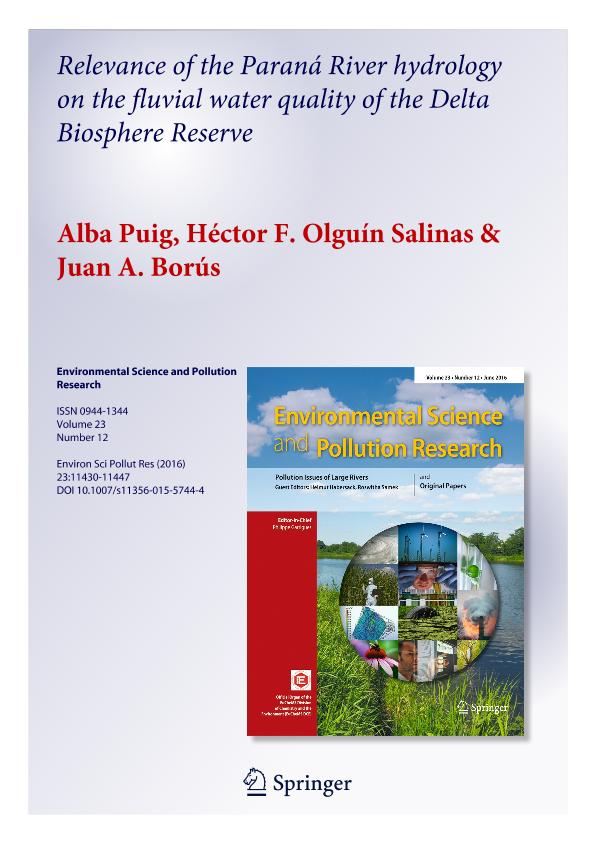Artículo
Relevance of the Paraná River hydrology on the fluvial water quality of the Delta Biosphere Reserve
Fecha de publicación:
11/2015
Editorial:
Springer Heidelberg
Revista:
Environmental Science and Pollution Research
ISSN:
0944-1344
e-ISSN:
1614-7499
Idioma:
Inglés
Tipo de recurso:
Artículo publicado
Clasificación temática:
Resumen
The increasing frequency of extreme events in large rivers may affect not only their flow, but also their water quality. In the present study, spatial and temporal changes in fluvial physico-chemical variables were analyzed in a mega-river delta during two extreme hydrological years (La Niña-El Niño) and related to potential explanatory factors. Basic water variables were evaluated in situ at 13 points (distant 2-35 km from each other) in watercourses of the Delta Biosphere Reserve (890 km2) in the Lower Paraná River (Argentina) in nine surveys (October 2008-July 2010) without meteorological tides. Samples for laboratory analyses were collected from each main river. Multivariate tests by permutations were applied. The period studied was influenced by a drought, within a long period dominated by low flows combined with dry weather and wildfires, and a large (10 years of recurrence) and prolonged (7 months) flood. The hydrological phase, followed by the season and the hydrological year (according to the ENSO event) were the principal explanatory factors of the main water quality changes, whereas the drainage sub-basin and the fluvial environment (river or stream) were secondary explanatory factors. During the drought period, conductivity, turbidity, and associated variables (e.g., major ions, silicon, and iron concentrations) were maximal, whereas real color was minimal. In the overbanking flood phase, pH and dissolved oxygen concentration were minimal, whereas real color was maximal. Dissolved oxygen saturation was also low in the receding flood phase and total major ion load doubled after the arrival of the overbanking stage. The water quality of these watercourses may be affected by the combination of several influences, such as the Paraná River flow, the pulses with sediments and solutes from the Bermejo River, the export of the Delta floodplain properties mainly by the flood, the season, and the saline tributaries to the Lower Paraná River. The high influence of the hydrology of this large river on the Delta fluvial water quality emphasizes the relevance of changes in its flow regime in recent decades, such as the seasonality attenuation. Considering that the effects of extreme events differ among and within fluvial systems, specific ecohydrological evaluations and powerful appropriate statistics are key tools to gain knowledge on these systems and to provide bases for suitable management measures in a scenario of climate change and increasing human alterations and demands.
Archivos asociados
Licencia
Identificadores
Colecciones
Articulos(MACNBR)
Articulos de MUSEO ARG.DE CS.NAT "BERNARDINO RIVADAVIA"
Articulos de MUSEO ARG.DE CS.NAT "BERNARDINO RIVADAVIA"
Citación
Puig, Alba; Olguin Salinas, Hector; Borús, Juan A.; Relevance of the Paraná River hydrology on the fluvial water quality of the Delta Biosphere Reserve; Springer Heidelberg; Environmental Science and Pollution Research; 23; 12; 11-2015; 11430-11447
Compartir
Altmétricas




